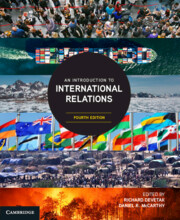Book contents
- Frontmatter
- Contents
- Tables, figures and boxes
- Contributors
- Preface and acknowledgements
- Guide to online instructor resources
- Introduction: The origins and changing agendas of international relations
- Part 1 Theories of International Relations
- Part 2 International history
- Part 3 The traditional agenda: States, wars and law
- Part 4 The new agenda: Globalisation and global challenges
- Chapter 20 Non-state actors: A sociology of International Relations?
- Chapter 21 Religion and secularism
- Chapter 22 Global economic institutions
- Chapter 23 Global trade and finance
- Chapter 24 Global poverty, inequality and development
- Chapter 25 Globalisation and its critics
- Chapter 26 Terrorism
- Chapter 27 The international politics of cyberspace
- Chapter 28 The changing character of warfare
- Chapter 29 Post-conflict state-building
- Chapter 30 Humanitarianism and armed intervention
- Chapter 31 Human rights
- Chapter 32 Global public health
- Chapter 33 Migration and refugees
- Chapter 34 Global environmental politics
- Chapter 35 Climate change
- Chapter 36 The futures of International Relations
- References
- Index
- Figure and text acknowledgements
Chapter 29 - Post-conflict state-building
from Part 4 - The new agenda: Globalisation and global challenges
Published online by Cambridge University Press: aN Invalid Date NaN
- Frontmatter
- Contents
- Tables, figures and boxes
- Contributors
- Preface and acknowledgements
- Guide to online instructor resources
- Introduction: The origins and changing agendas of international relations
- Part 1 Theories of International Relations
- Part 2 International history
- Part 3 The traditional agenda: States, wars and law
- Part 4 The new agenda: Globalisation and global challenges
- Chapter 20 Non-state actors: A sociology of International Relations?
- Chapter 21 Religion and secularism
- Chapter 22 Global economic institutions
- Chapter 23 Global trade and finance
- Chapter 24 Global poverty, inequality and development
- Chapter 25 Globalisation and its critics
- Chapter 26 Terrorism
- Chapter 27 The international politics of cyberspace
- Chapter 28 The changing character of warfare
- Chapter 29 Post-conflict state-building
- Chapter 30 Humanitarianism and armed intervention
- Chapter 31 Human rights
- Chapter 32 Global public health
- Chapter 33 Migration and refugees
- Chapter 34 Global environmental politics
- Chapter 35 Climate change
- Chapter 36 The futures of International Relations
- References
- Index
- Figure and text acknowledgements
Summary
Kabul fell to the Taliban in August 2021 despite peace talk efforts in late 2020 and early 2021. International pundits had been predicting that Ashraf Ghani’s government might need to share power with a resurgent Taliban, but none had expected such a swift and complete takeover as the Americans readied to leave for good. Two decades of international intervention in Afghanistan were erased. The efficacy and desirability of intervention has been thrown into serious doubt, and with it the prospects for post-conflict state-building. This chapter introduces the rise, and possible fall, of the post-conflict state-building agenda. It introduces the reader to important concepts, noting the relationships between state-building, peace-building and nation-building, as well as underscoring the role of liberal ideology in shaping post-conflict state-building efforts, asking readers to reflect on what they believe external actors should, or should not, do.
Keywords
- Type
- Chapter
- Information
- An Introduction to International Relations , pp. 386 - 397Publisher: Cambridge University PressPrint publication year: 2024



